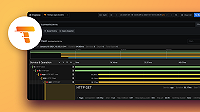Important: This documentation is about an older version. It's relevant only to the release noted, many of the features and functions have been updated or replaced. Please view the current version.
Tail-based sampling
Tempo aims to provide an inexpensive solution that makes 100% sampling possible. However, sometimes constraints will make a lower sampling percentage necessary or desirable, such as runtime or egress traffic related costs. Probabilistic sampling strategies are easy to implement, but also run the risk of discarding relevant data that you’ll later want.
In tail-based sampling, sampling decisions are made at the end of the workflow allowing for a more accurate sampling decision. The Grafana Agent groups span by trace ID and check its data to see if it meets one of the defined policies (for example, latency or status_code). For instance, a policy can check if a trace contains an error or if it took longer than a certain duration.
A trace will be sampled if it meets at least one policy.
To group spans by trace ID, the Agent buffers spans for a configurable amount of time, after which it will consider the trace complete. Longer running traces will be split into more than one. However, waiting longer times will increase the memory overhead of buffering.
One particular challenge of grouping trace data is for multi-instance Agent deployments, where spans that belong to the same trace can arrive to different Agents. To solve that, you can configure the Agent to load balance traces across agent instances by exporting spans belonging to the same trace to the same instance.
This is achieved by redistributing spans by trace ID once they arrive from the application. The Agent must be able to discover and connect to other Agent instances where spans for the same trace can arrive. For kubernetes users, that can be done with a headless service.
Redistributing spans by trace ID means that spans are sent and received twice, which can cause a significant increase in CPU usage. This overhead will increase with the number of Agent instances that share the same traces.

Quickstart
To start using tail-based sampling, define a sampling policy. If you’re using a multi-instance deployment of the agent, add load balancing and specify the resolving mechanism to find other Agents in the setup. To see all the available configuration options, refer to the configuration reference.
traces:
configs:
- name: default
...
tail_sampling:
policies:
# sample traces that have a total duration longer than 100ms
- latency:
threshold_ms: 100
# sample traces that contain at least one span with status code ERROR
- status_code:
status_codes:
- "ERROR"
load_balancing:
resolver:
dns:
hostname: host.namespace.svc.cluster.localExamples
Sampling logic can be summarized into two rules:
- If a policy is met, the trace is sampled. Even if other policies are not met.
- If any of the spans of the trace meet the policy requirements, the trace is sampled.
Next, there are a couple of examples of tail_sampling configurations,
with descriptions of the policies and the expected behavior.
Sampling by latency and status
Sampling traces that have a total duration longer than 100ms and traces that contain at least one span with status code ERROR.
Total duration is determined by looking at the earliest start time and latest end time.
traces:
configs:
- name: default
...
tail_sampling:
policies:
- type: latency
latency:
threshold_ms: 100
- type: status_code
status_code:
status_codes:
- "ERROR"Sampling by attributes
Sampling traces that do not contain the attribute http.endpoint equal to /status and /metrics.
traces:
configs:
- name: default
...
tail_sampling:
policies:
- attributes:
- name: http.endpoint
values:
- /status
- /metrics
invert_match: trueSampling with and policy
Sampling traces that have an attribute http.endpoint that matches /api/v1/*
and that have a total duration longer than 100ms.
traces:
configs:
- name: default
...
tail_sampling:
policies:
- type: and
and:
and_sub_policy:
- type: string_attribute
string_attribute:
- name: http.endpoint
value: /api/v1/*
enabled_regex_matching: true
cache_max_size: 10
- type: latency
latency:
threshold_ms: 100Multi-requirement sampling
Sampling requirements are the following:
- Service A: latency> 3s
- Service B: only error spans or latency> 5s
- Service C: all spans
traces:
configs:
- name: default
...
tail_sampling:
policies:
# Service A: latency> 3s
- type: and
and:
and_sub_policy:
- type: latency
name: latency
latency:
threshold_ms: 3000
- type: string_attribute
name: service-name
string_attribute:
name: service.name
values:
- serviceA
# Service B requires two and policies
# 1. spans with status code ERROR
- type: and
and:
and_sub_policy:
- type: status_code
name: status_code
status_code:
status_codes:
- "ERROR"
- type: string_attribute
name: service-name
string_attribute:
name: service.name
values:
- serviceB
# 2. latency> 5s
- type: and
and:
and_sub_policy:
- type: latency
name: latency
latency:
threshold_ms: 5000
- type: string_attribute
name: service name
string_attribute:
name: service.name
values:
- serviceB
# Service C: all spans
- type: string_attribute
string_attribute:
name: service.name
values:
- serviceCSampling based on k8s metadata
In this example, the Agent will sample traces that come from pods from the namespace default.
Via scrape_configs, spans are relabeled with kubernetes metadata,
in this case injecting the namespace attribute.
traces:
configs:
- name: default
...
scrape_configs:
- job_name: kubernetes-pods
kubernetes_sd_configs:
- role: pod
relabel_configs:
- action: replace
source_labels:
- __meta_kubernetes_namespace
target_label: namespace
tail_sampling:
policies:
- type: string_attribute
string_attribute:
name: namespace
values:
- defaultWas this page helpful?
Related resources from Grafana Labs



